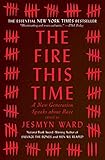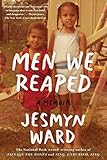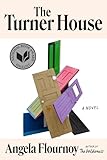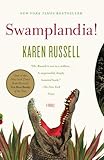
Jesmyn Ward hadn’t realized it’s been more than half a decade since her National Book Award-winning Salvage the Bones made her a literary star. That’s because she has been extremely busy, both professionally and personally.


 Since her Hurricane Katrina-centric novel, the author wrote the raw and emotional Men We Reaped, a memoir about losing five family members and friends to drugs, suicide, and accidents that can only happen to young, poor, black men. She also edited The Fire This Time, an essay and poetry collection about race and identity written by this generation’s brightest talents. She also moved with her husband and children back to DeLisle, Miss., the small, poverty-stricken town where she grew up. She lived there and survived Hurricane Katrina before going to Stanford and the University of Michigan to pursue higher education.
Since her Hurricane Katrina-centric novel, the author wrote the raw and emotional Men We Reaped, a memoir about losing five family members and friends to drugs, suicide, and accidents that can only happen to young, poor, black men. She also edited The Fire This Time, an essay and poetry collection about race and identity written by this generation’s brightest talents. She also moved with her husband and children back to DeLisle, Miss., the small, poverty-stricken town where she grew up. She lived there and survived Hurricane Katrina before going to Stanford and the University of Michigan to pursue higher education.
Even though Ward was busy producing non-fiction, readers anxiously awaited her fiction followup to Salvage the Bones. Ward’s third novel, Sing, Unburied, Sing, returns to similar settings and themes as her previous works, but is wholly original. Set in modern Mississippi, the novel follows Jojo, a 13-year-old of mixed race, and his drug addict mother as they drive to pick up his father from state prison. The mix of harsh reality and magical realism create a sense of wonderment that makes readers question what they know about identity.
Ward and I spoke via phone about racial tensions, why history is so important, how hurricanes effect those who survive them, as well as what she hopes readers will remember about her novels.
The Millions: I wanted to start our conversation with Salvage the Bones. It came out in 2011 and won the National Book Award. It’s been a little more than half a decade, and I was curious about how your relationship with the book or the characters has changed since the book’s release.
Jesmyn Ward: I didn’t realize it had been so long. That’s so crazy. My characters remain with me in one way or another even after I’m done. I don’t know if I’ll ever return to those characters in a sequel, but I definitely still think about them. Especially now with Hurricane Harvey and Houston or whenever we encounter another hurricane and we witness the kind of devastation we are witnessing right now. I think about them lately because I wonder if people who read the book and read about this family who couldn’t leave see what is happening currently and think about Salvage the Bones and those characters.
Those characters still live with me. I still think about Skeet, Esch, and Big Henry, I actually roped them into the end of Sing, Unburied, Sing and it was nice to see them again. Part of the reason it’s been a surprise to me that it’s been so long since Salvage was published is because whenever I think about those characters, I can only age them by a couple of years. It’s hard for me to think of where they’d be now, 11 years later after Hurricane Katrina.
That showed up in Sing because when I was writing that moment when Esch showed up, I felt she was two years older than she was at the end of Salvage and my editor, of course, caught it. She pointed out that the character would need to be 10 years older now. She hadn’t aged at all in my head. Maybe that’s a deficiency on my part because I can’t age them. They live with me though as they existed in their books.
TM: Were you working on Sing, Unburied, Sing during the entire time since Salvage?
JW: No, not really. After I finished the rough draft of Salvage the Bones, which was in 2009, I began working on Sing, Unburied, Sing, but it was a very different book then. When I say I was working on it, I meant I was working on unsuccessful first chapter after unsuccessful first chapter. Jojo’s character was the only character that was present and real to me at that time. I didn’t know anything about his mom, his dad, or the rest of his family. In the beginning his mom was white [as opposed to black in the final version]. My understanding of who the members of his family are changed a lot. I couldn’t write a good first chapter when I didn’t have a clear understanding of who the other characters were. I spent a good four of five months writing bad first chapter after bad first chapter.
Then I decided I should work on what would become the memoir Men We Reaped. I just put those bad first chapters away. I set Jojo aside and worked on the memoir. Following that, I edited the collection The Fire This Time. While I was working on The Fire This Time was when I started working on this novel again. I did take a substantial break but I came back to it again.
It was very hard with me for Sing to find a successful entryway into the story. I think part of the reason it was difficult was because I couldn’t figure out who the people around Jojo should be and who they were. That’s where I start: I need a vague understanding of who the most important characters are and what their motivations are. That was very hard for me to pin down with this book. It took me a long time.
After I finished Men We Reaped was when I returned to Jojo. I threw out everything I had before and I just started again. Once I figured out who Leonie, Pop, and Mam were I gained some traction. I used the momentum to move into the second chapter. Then I was able to move through that first rough draft.
TM: This novel has a very serious, realistic undertone, but it also has this notion of ghosts and magical realism thrown in. When did that come into play with the story?
JW: From the very beginning, I knew that Leonie was seeing a phantom. In the very beginning, she was seeing a phantom of Michael. For the first four chapters of the rough draft she was seeing a phantom of Michael and it just wasn’t working. I figured out it wasn’t working because his presence didn’t add to the understanding of who she was. Leonie was a very difficult character for me to write because I couldn’t figure out what was motivating her to be such a horrible parent and sometimes a horrible person. All that told me about her was that she was in love with this man and perhaps she was hallucinating because of the drugs she was using. It didn’t tell me anything that I already didn’t know about her and who she loved and valued. It felt like something was wrong.
Then I began rethinking that phantom of someone she actually lost; not just a man she loved who was in prison. What if it was a family member she lost. That’s when I stumbled upon the fact that she would have lost a brother and that it was his ghost she was seeing.
Instead of going back and correcting that in the first four chapters I had already written, I wrote going forward with that idea that the phantom was her brother. I wrote with that assumption and suddenly she began to work for me as a character. She took on new life. I understand her motivation. I understood the pain in her heart that she carried with her. By her not dealing with that pain, it feeds into how selfish and egotistical she is. It makes her a worse parent because she’s so wrapped up in this pain that she isn’t able to resolve.
That’s when I knew there was one ghost: the ghost of her dead brother. At the same time I was working on the beginning of this, I read about Parchman Prison. I came across this bit that there were black boys as young as 12 that were charged with petty crimes and spent time in Parchman. I read that and I knew how brutal the prison was and that fact was heartbreaking.
I wanted a child to be part of my novel and be present in the moment. I figured the only way I can make that happen was to make him a ghost. I wanted him to exist in the present moment and not just exist in a flashback. I wanted him to be able to interact with Jojo.

 TM: When I was reading Sing, I thought a lot about The Turner House and Swamplandia. Is this idea of ghosts, ghost stories, and the past as part of everyday life in southern or black culture?
TM: When I was reading Sing, I thought a lot about The Turner House and Swamplandia. Is this idea of ghosts, ghost stories, and the past as part of everyday life in southern or black culture?
JW: I think that ghosts are embodiments of the past. Especially here in the South because we’re so close to the past. So much of the past lives in the present. We live with the ramifications of the past that might not be as clear or feel as present in the rest of the country.
I sit and think of the furor we live with regarding Confederate monuments and the endless debates about whether or not to take them down. I think about all of the advocacy and opposition. We’re still dealing with monuments from a war that happened 150, 160 years ago. The violence that surrounds that history is still very present.
In the South, we may not talk about it or it may not be a part of public conversation around these issues, but the underlying understanding is that the history of this region bears very heavily on the present and informs our actions. I think the ghost story form is a great way to explore and express that.
TM: You’ve been very outspoken about racial tension in America. I know the media is discussing this more, but I think there is still a disconnect where most of the country doesn’t really understand what it’s like to be in these situations. Do you think about this when you’re writing?
JW: I do. It influences my work because my awareness of history and the legacy of racist violence in this country bears heavily on my thinking when I’m casting about for ideas for my novels. I’m always thinking about race, violence, the history of the South, and how that history bears on the present.
I saw Ann Patchett speak 10 or 15 years ago and one thing she mentioned in her speech was that how she thought writers write the same book over and over again because they’re obsessed with the same ideas. Those ideas always surface in each story they write. As I’ve written more fiction and creative non-fiction, I’ve found that is true in my case. I’m always thinking about how black people survive. How people are marginalized in the South and the way they still survive that oppression.
I do have to say that when I’m writing and I’ve immersed myself in that world with those characters, then I am just thinking about the characters in the story and who they are and how they are evolving. I’m trying to find the important moments in their lives—moments beyond which nothing is the same. That’s what I’m thinking about when I’m writing. I’m not thinking about themes or symbolism. When I’m actually writing I’m just thinking about the people.
I think about the issues and big ideas when I’m thinking about novel ideas, but once I begin writing I throw that all out the window because the work is able to come alive and these people are able to live when you immerse yourself in the world.
TM: Earlier you mentioned how devastating Hurricane Harvey is to the people of Texas. I know you were still living in the Mississippi Gulf Coast when Hurricane Katrina hit. If you don’t mind, I was just curious what life was like for residents after the media and most of the country move on from these tragic events? What do families go through? What is it like having to restart?
JW: It’s really difficult. Donations do make a difference because they help people who are attempting to rebuild their lives. Habitat for Humanity did a lot of work here after Hurricane Katrina. They rebuilt a lot of homes. It’s a hard question to answer because a lot of people had house insurance and made house insurance claims, but that didn’t work for everyone. Some claims were denied on technicalities. A lot of the rebuilding that people had to do down here was out of their own pockets. It was a slow process. They rebuilt as they were able to slowly save the money that they needed to rebuild.
That’s one of the reasons a hurricane appears out in the Gulf—and I don’t want anyone to go through the pain we went through—but I’m always grateful when the hurricanes don’t come for us. I still feel like a decade after Katrina, we’re not ready. There was just extreme flooding in New Orleans two or three weeks ago from just a bad rainstorm. The streets were flooding and homes were damaged. It’s a hard question for me to answer because it’s still a continuous process.
TM: Your memoir came out between Salvage and Sing. Do you ever think about more memoirs on different topics?
JW: Right now, no. I really don’t want to write another memoir. There are many reasons for that. Men We Reaped was the hardest book I’ve ever written. It required that I make myself vulnerable. It required that I make the members of my family vulnerable. I had to tell the truth and reveal all of these secrets about our lives and that was very hard to do. I don’t know if I can do that again.
It was important to me because I had to write that book to tell my brother’s story. I had to tell the story about my friends and my cousin. Men We Reaped came out before Black Lives Matter was a movement. I almost feel like at that time I was trying to express the sum of the opinions that Black Lives Matter has expressed, but I didn’t have the vocabulary to do so. That book was difficult to write because I didn’t have that vocabulary to write about these people that I loved and lost.
Fiction is easier than creative non-fiction for me. Creative non-fiction is hard for me in general whether it’s essays or a book-length memoir because I tend to shy away from the pain of what I’m writing about. It makes me write around my subject instead of focusing. Creative non-fiction is a lot of work for me and my editors because they have to make me focus on whatever I’m trying to avoid in the piece I’m working on.
So, no, I don’t want to tackle another non-fiction book, but who knows in 20 years?
TM: Is it going to be another half decade before your next work of fiction comes out?
JW: I have something percolating, but it’s probably going to take me some time to finish. It might be another four or five years before it comes out. I’m writing the first chapter of the rough draft. I’m at the very beginning of the process.
The novel is set in New Orleans at the height of the domestic slave trade during the early 1800s. It’s unlike anything I’ve ever written before. It’s definitely challenging me as a writer and as a human being because the main characters in this are people who were enslaved. It’s really hard to sit with that. The subject matter is making it hard for me to write this novel. Hopefully it will be done in four or five years. That’s including the rough first draft and multiple revisions of that.
TM: What is your hope of what people walk away with after they finish Sing, Unburied, Sing?
JW: I hope that the characters stay with them. That Jojo, Leonie, Kayla, Ritchie, and Pop stay with them. That next time readers encounter an older black gentleman in the grocery story or the next time they unfortunately see a 14- or 15-year-old black boy like Jojo dead from police violence that maybe it’s a bit more painful and a bit more prevalent for them because they’ve seen the humanity in the characters I’ve written. Maybe that makes it a little easier for them to see humanity and personhood.









